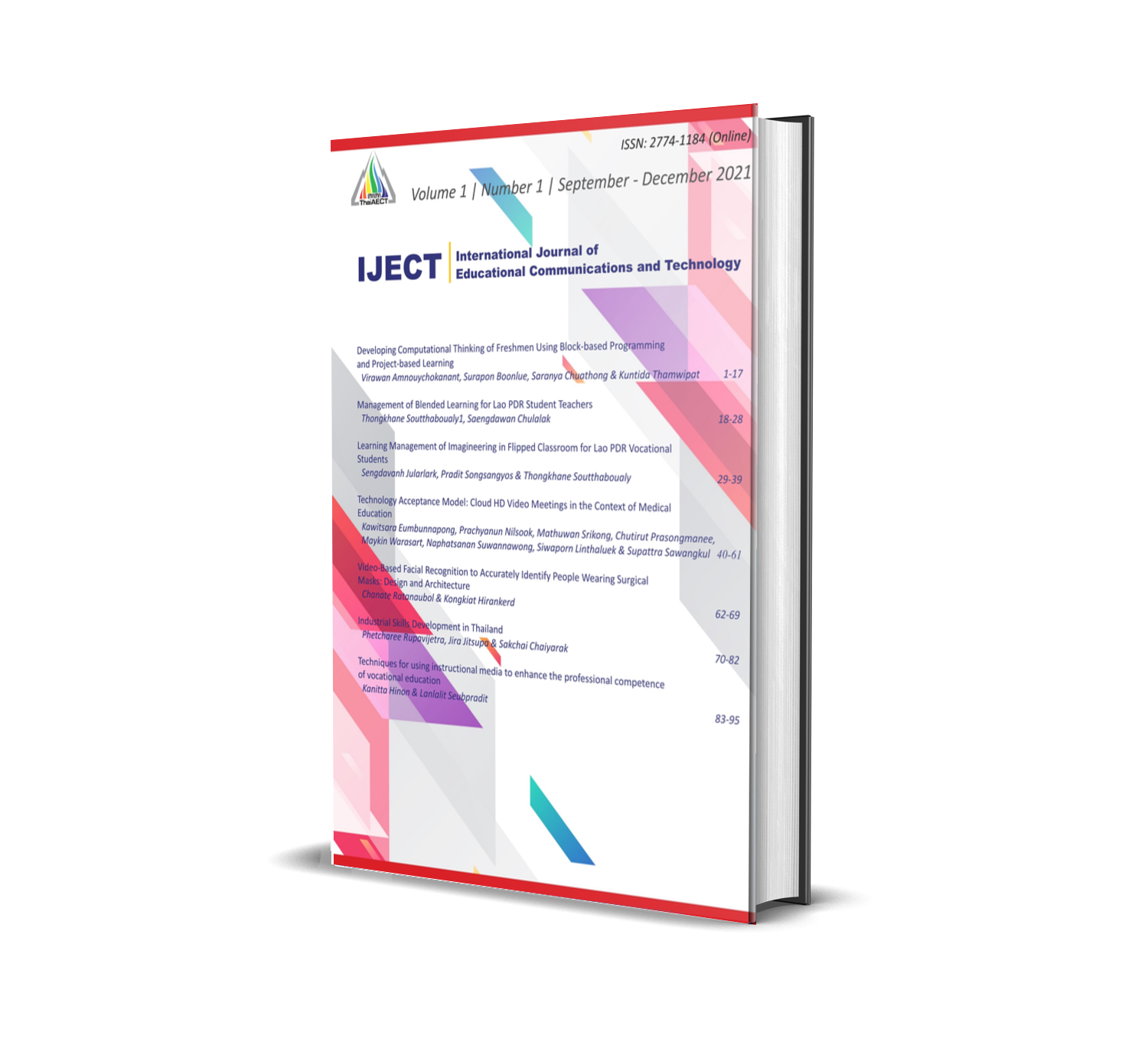The Hybrid Case-Based Learning Design for Digital Life
Keywords:
Hybrid Learning, Case-Based Learning, Digital LifeAbstract
Currently, general education in Thailand after the COVID-19 epidemic has adapted and changed a lot. Both the behavior of the learners that resulted in the teacher needing to modify and develop the teaching and learning style to be consistent and suitable for the current learning situation and the technology that has been developed have greatly contributed to education. Hybrid learning and case-based learning, or case studies, are still methods that can be further developed to be more effective. Thus, an amalgamated learning design with elements of case studies and hybrid learning was created to meet the needs of educational technology and flexibility among higher education learners and to be consistent with the lesson content of general education course code GEN0309, Digital Life, which emphasizes learning with examples or simulations to be more efficient and streamlined and to be able to promote the knowledge and digital skills of learners. After the research process found that based on the results of the hybrid case-based learning design for digital life model, which divides the learning into 5 levels and has 5 levels of learning components, consisting of Level 1. Case Preparation Step 2. Multiple Perspectives Step 3. Solutions Suggestion Step 4. Fact Decision and Step 5. Discuss Presentation proposed resulting in a teaching and learning model for learners that is suitable for the Digital Life course and answers the need for technology that can be used in conjunction with learning effectively because it is a blended learning technique. This is a teaching and learning management system that combines the advantages of online learning (Online Learning) and Face-to-Face learning together perfectly. Emphasis is placed on combining a variety of teaching methods to create interaction between learners and teachers. It also has a positive effect on academic progress, student satisfaction, and communication abilities.
References
Aha, D. W. (1991). Case-Based Learning Algorithms. Proceedings of the 1991 DARPA Case-Based Reasoning Workshop.
Alnajdi Mosa, S. (2014). Hybrid Learning in Higher Education. Society for Information Technology & Teacher Education International, 214–220. https://www.researchgate.net/publication/318361485
Athonvarangkul, P., Dibyamadala, J., & Mangkhang, C. (2021). The Implementation of Hybrid Learning Approach for Digital Task Based Language Teaching (DTBLT).
Ayub, E., Lim, C. L., Yeo, D. C. H., & Ismail, S. R. (2022). Developing a Solution for Hybrid Classroom: A Pilot Study From a Malaysian Private University. Frontiers in Education, 7. https://doi.org/10.3389/feduc.2022.841363
Bamrungsetthapong, S., Tharnpanya, P., & Satjaharuthai, K. (2020). Hybrid Learning and the Quality Improvement of Thailand’s Education in the 21st Century.
Flynn, A. E., & Klein, J. D. (2001). The Influence of Discussion Groups in a Case-Based Learning Environment.
Gamage, K. A. A., Gamage, A., & Dehideniya, S. C. P. (2022). Online and Hybrid Teaching and Learning: Enhance Effective Student Engagement and Experience. Education Sciences, 12(10). https://doi.org/10.3390/educsci12100651
James, M., Baptista, A. M. T., Barnabas, D., Sadza, A., Smith, S., Usmani, O., & John, C. (2022). Collaborative case-based learning with programmatic team-based assessment: a novel methodology for developing advanced skills in early-years medical students. BMC Medical Education, 22(1). https://doi.org/10.1186/s12909-022-03111-5
Kanhadilok, S., Punsumreang, T., & Malai, C. (2019). A Design of Case Based Learning for Promoting Learning Outcomes in Practicum. In Nursing (Vol. 39).
Kanthong, P. (2018). The Development of Online Case Study Based Learning Model to Enhance Critical Thinking Ability of Student in Higher Education Level.
Kaur, G., Rehncy, J., Kahal, K. S., Singh, J., Sharma, V., Matreja, P. S., & Grewal, H. (2020). Case-Based Learning as an Effective Tool in Teaching Pharmacology to Undergraduate Medical Students in a Large Group Setting. Journal of Medical Education and Curricular Development, 7, 238212052092064. https://doi.org/10.1177/2382120520920640
Kazu, İ. Y., Kurtoğlu, C., Ii, Y., İbrahim, I., Kazu, Y., & Prof, A. (2022). Investigation of the Effectiveness of Hybrid Learning on Academic Achievement: A Meta-Analysis Study. Cemre Kurtoğlu Yalçın, English Teacher, Ministry of National Education International Journal of Progressive Education, 18, 2022. https://doi.org/10.29329/ijpe.2022.426.14
Kitroongrueng, P. (2010). The Development of an Instructional Model using Case Based Learning Based on Science of Teaching to Enhance Student Teacher’s Critical Thinking.
Kongsumruay, K., Nedpakdee, R., & Srito, C. (2021). Using Online Tools for Teaching English in Epidemic Situations of Emerging and Re-Emerging Diseases: Paradigm and Implement with Hybrid Learning.
Kusoom, W., & Hengyotmakt, A. (2019). The Effects of Case-Based Learning on Nursing Students’ Knowledge Retention.
Loertbumrungchai, K. (2021). Hybrid Learning the Adaptive Learning. In Adaptation Classroom: Hybrid Learning.
McLean, S. F. (2016). Case-Based Learning and its Application in Medical and Health-Care Fields: A Review of Worldwide Literature. Journal of Medical Education and Curricular Development, 3, JMECD.S20377. https://doi.org/10.4137/jmecd.s20377
Meydanlioglu, A., & Arikan, F. (2014). Effect of Hybrid Learning in Higher Education. World Academy of Science, Engineering and Technology International Journal of Information and Communication Engineering, 8(5).
Raes, A. (2022). Exploring Student and Teacher Experiences in Hybrid Learning Environments: Does Presence Matter? Postdigital Science and Education, 4(1), 138–159. https://doi.org/10.1007/s42438-021-00274-0
Raza, S. A., Qazi, W., & Umer, B. (2020). Examining the impact of case-based learning on student engagement, learning motivation and learning performance among university students. Journal of Applied Research in Higher Education, 12(3), 517–533. https://doi.org/10.1108/JARHE-05-2019-0105
Rodrigo, R. T., & Platon, L. H. (2022). Hybrid learning for the digital natives: Impacts on academic performance and learning approaches. Kasetsart Journal of Social Sciences, 43(1), 201–208. https://doi.org/10.34044/j.kjss.2022.43.1.27
Sanpanich, N. (2021). Investigating Factors Affecting Students’ Attitudes toward Hybrid Learning. In rEFLections (Vol. 28, Issue 2).
Sisamud, K., Wannapiroon, P., & Palee, P. (2020). Development of the Hybrid Learning Model with Design Thinking Process to Develop the Creativity.
Srinivasan, M., Wilkes, M., Stevenson, F., Nguyen, T., & Slavin, S. (2007). Comparing Problem-Based Learning with Case-Based Learning: Effects of a Major Curricular Shift at Two Institutions. Academic Medicine, 82(1). http://journals.lww.com/academicmedicine
Tadsawa, W. (2020). Development of Program Enhancing Digital Ethics Reasoning Abilities of Lower Secondary School Students using Outcome-Based Education and Case-Based Learning Approaches.
Thanthong, S. (2020). Theory and Learning in the Digital Age: Connectivism and Hybrid or Blended Learning. 14.
Williams, B. (2005). Case based learning - A review of the literature: Is there scope for this educational paradigm in prehospital education? In Emergency Medicine Journal (Vol. 22, Issue 8, pp. 577–581). https://doi.org/10.1136/emj.2004.022707
Zhao, W., He, L., Deng, W., Zhu, J., Su, A., & Zhang, Y. (2020). The effectiveness of the combined problem-based learning (PBL) and case-based learning (CBL) teaching method in the clinical practical teaching of thyroid disease. BMC Medical Education, 20(1). https://doi.org/10.1186/s12909-020-02306-y
Downloads
Published
How to Cite
Issue
Section
License
Copyright (c) 2023 International Journal of Educational Communications and Technology

This work is licensed under a Creative Commons Attribution-NonCommercial-NoDerivatives 4.0 International License.







